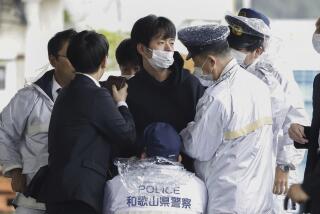Japanese Rightist Kills Self at Newspaper : Press: He shoots himself while meeting Asahi president to protest an unflattering cartoon.
- Share via
TOKYO — A prominent Japanese nationalist shot and killed himself with two pistols Wednesday while meeting the president of a leading newspaper to protest a cartoon ridiculing his political party.
Shusuke Nomura, 58, who launched a campaign last year against the Asahi Shimbun, Japan’s most prestigious national daily, and declared he would “stake my life” against its editorial policies, had been escorted to the meeting by his son, among others.
Nomura’s campaign against the newspaper was the latest in a series of attempts to intimidate the mass media, efforts that critics say are threatening freedom of speech and of the press in Japan.
While meeting in an executive reception room with Toshitada Nakae, Asahi president, Nomura suddenly broke off 75 minutes of conversation and opened a briefcase, pulling out a gift for one of three followers who had accompanied him.
“This is for your wedding, which I won’t be able to attend,” he said.
To his son, 19, he said, “Listen to what your mother says.”
Then he pulled out two pistols concealed in his kimono, bowed in the direction of the Imperial Palace and, sitting cross-legged in front of Nakae and five other Asahi executives, shouted, “The Asahi Shimbun and I will die together.”
Making no attempt to fire at the Asahi executives, Nomura placed a pistol on each side of his stomach above the waist and fired the weapons simultaneously. He was declared dead at a hospital 90 minutes later.
Hiroaki Yamamoto, head of the Asahi’s reader information division, who participated in the meeting, provided the description of what happened. Nomura’s followers were not identified, and the newspaper withheld the name of Nomura’s son.
Yamamoto said that Nakae was meeting with Nomura to help conclude negotiations with the rightist over his complaints against the newspaper. Nomura was well known for provocative acts: He spent 18 years in jail for torching a politician’s home in 1963 and for staging a siege with a sword at the headquarters of the nation’s leading business organization in 1977.
Minutes before Wednesday’s incident, Hiromichi Tachibana, the Asahi’s director of publications, left the meeting to go to a hotel about two miles away to read an apology before a rightist symposium that Nomura had been scheduled to attend.
Yamamoto said Nomura made two protests to the company--one over a cartoon that appeared in July, 1992, in the Weekly Asahi magazine, a subsidiary of the newspaper, and the other about Asahi’s overall editorial policy, which Nomura called “un-Japanese.” Yamamoto said the Asahi had apologized only for the cartoon. “There will be no change in Asahi’s overall editorial policy,” he said.
Although the Weekly Asahi itself apologized last December, Yamamoto refused to explain why the corporation did not apologize until Wednesday. He said only that the Asahi had continued discussions with the rightist about “nationhood and national ethnicity” during the last 10 months.
A 600-page account of Nomura’s conversations with the Asahi was to be published today.
Yamamoto also denied that Nomura had made any threats before the newspaper apologized for the cartoon that lampooned Nomura’s fledgling political party. The cartoon, in a pun, dropped one stroke from one of the characters for the party’s name, changing the meaning from “Wind Assn.” to “Vermin (Lice) Assn.”
The executive said the newspaper had decided that the ridicule was improper because it was done during a campaign for a July, 1992, election for the upper house of Parliament. Nomura’s party won only 220,000 votes and elected no candidates.
In an interview with The Times on Sept. 3, 1992--a month before he launched his anti-Asahi campaign--Nomura declared that he would “stake my life” against the Asahi’s “un-Japanese editorial policy” and the cartoon slur.
“Japanese consider staking one’s own life a virtue, you know,” he said in that interview.
He castigated the Asahi for “un-Japanese” policies that, among other things, he said, played down the importance of nationalism and stressed Japan’s responsibility for World War II.
In a letter he entrusted to one of his followers to be read at the symposium Wednesday, he condemned Prime Minister Morihiro Hosokawa, who started his career as an Asahi reporter, for declaring that Japan had committed “a war of aggression.”
The suicide at the Asahi headquarters is likely to remain as a memorial of protest against the newspaper in the minds of Japanese nationalists, much as rightists have consecrated the 1970 hara-kiri suicide by author Yukio Mishima as a memorial to the prewar power of the emperor.
Meanwhile, the Asahi faced new troubles on another front.
The news director of its TV network, Sadayoshi Tsubaki, who resigned Tuesday, was summoned Wednesday to testify in Parliament. Tsubaki was accused of ordering TV Asahi reporters to slant coverage of a general election last July to bring about the defeat of the Liberal Democratic Party, which had ruled Japan for 38 years. He denied the charge.
More to Read
Sign up for Essential California
The most important California stories and recommendations in your inbox every morning.
You may occasionally receive promotional content from the Los Angeles Times.













